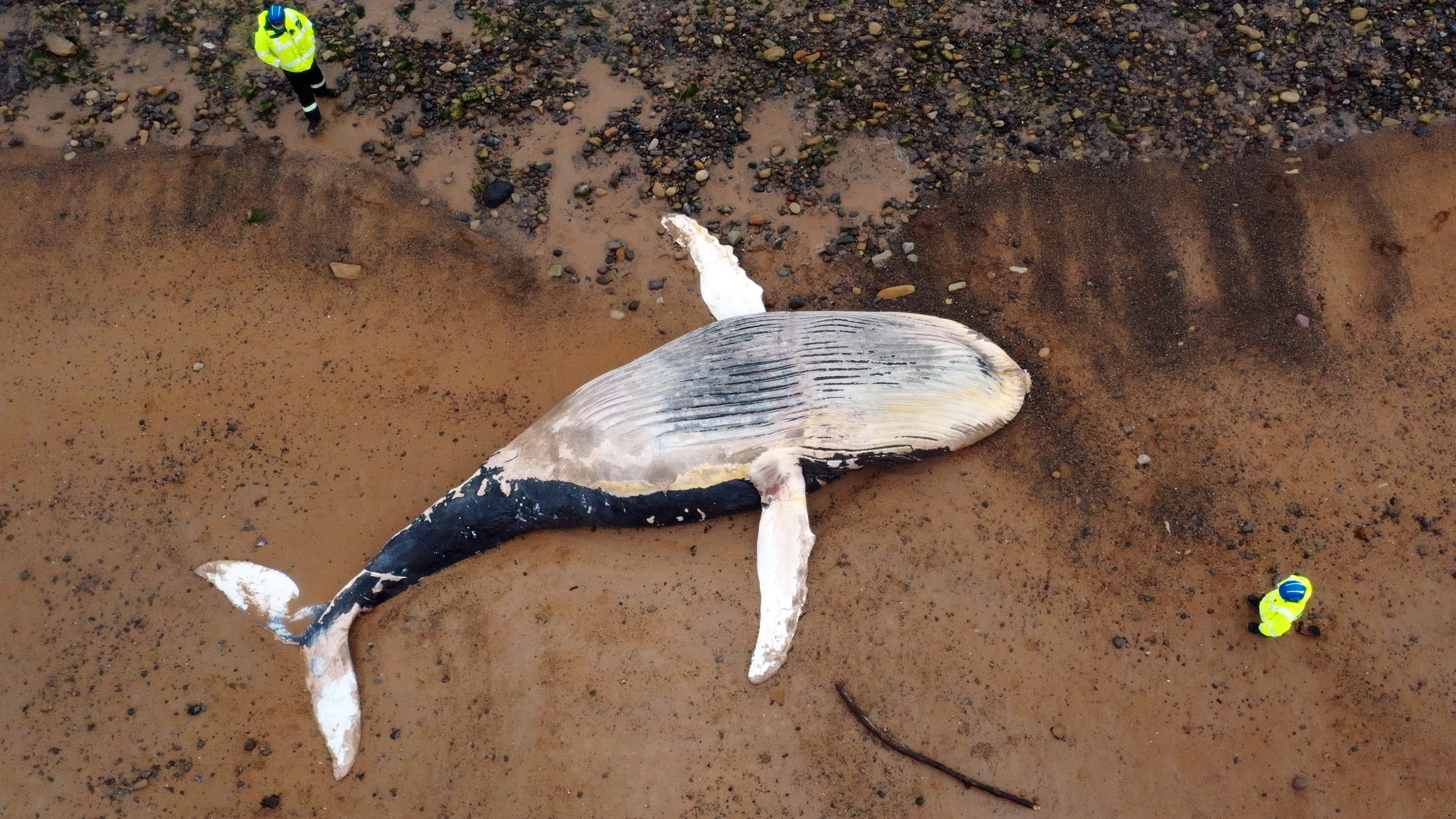Dead juvenile humpback whale washes up on UK beach
The whale, known as "Humpy," was first spotted dead weeks ago.

Get the world’s most fascinating discoveries delivered straight to your inbox.
You are now subscribed
Your newsletter sign-up was successful
Want to add more newsletters?

Delivered Daily
Daily Newsletter
Sign up for the latest discoveries, groundbreaking research and fascinating breakthroughs that impact you and the wider world direct to your inbox.

Once a week
Life's Little Mysteries
Feed your curiosity with an exclusive mystery every week, solved with science and delivered direct to your inbox before it's seen anywhere else.

Once a week
How It Works
Sign up to our free science & technology newsletter for your weekly fix of fascinating articles, quick quizzes, amazing images, and more

Delivered daily
Space.com Newsletter
Breaking space news, the latest updates on rocket launches, skywatching events and more!

Once a month
Watch This Space
Sign up to our monthly entertainment newsletter to keep up with all our coverage of the latest sci-fi and space movies, tv shows, games and books.

Once a week
Night Sky This Week
Discover this week's must-see night sky events, moon phases, and stunning astrophotos. Sign up for our skywatching newsletter and explore the universe with us!
Join the club
Get full access to premium articles, exclusive features and a growing list of member rewards.
A partially decomposed 36-foot-long (11 meters) juvenile humpback whale carcass washed up on a beach in the U.K. weeks after the animal was first spotted dead in the water.
The whale, nicknamed Humpy, washed up at 7:15 a.m. local time Friday (March 19) on England's Northumberland coast. Humpy was first identified in the area on Jan. 31 by the U.K. Humpback Catalogue, a citizen science project that identifies humpbacks in British waters from photographs sent by the public.
Humpy was confirmed dead on March 5 after the body was found caught in some ropes. Now that the whale's body has washed ashore, the local council has warned people to avoid the area until the body can be removed, because the "partially decomposed carcass" is emitting an "unpleasant smell," according to the BBC.
Related: 13 bizarre things that washed up on beaches
"They do have a bit of a unique stench that seems good at clinging to clothes afterwards," Dan Jarvis, a field support officer for the British Divers Marine Life Rescue (BDMLR) who wasn't involved in the incident, told Live Science. "Given the size of the animal, the smell will envelop a fairly large area, especially downwind."
Humpy is the third humpback whale to be found dead in the U.K. this year; one was spotted in Scotland on March 5, and another washed up in Cornwall on March 12, according to the U.K. Humpback Catalogue.
On the rise
The number of humpback whales in British waters has been on the rise in recent years because of increased stocks of herring, which are a favorite of ocean mammals. Last year, 119 humpback sightings were reported in the U.K. — the third-highest number of sightings on record, according to data from the Sea Watch Foundation.
Get the world’s most fascinating discoveries delivered straight to your inbox.
"With more animals visiting our waters, it's inevitable that we will also see more strandings," Jarvis said.
Populations have rebounded after decades of intensive whaling in the mid-20th century and ocean conditions have changed rapidly due to climate change, both of which may also explain why more humpbacks are frequenting U.K. waters, Jarvis said.
Getting tangled up
Scientists don't know why Humpy died, and the body is too decomposed for a full necropsy to take place, according to the BBC.
Although the body was tangled in ropes, it is unclear if entanglement killed Humpy or if the carcass became entangled after death. However, entanglement is generally a big problem for humpbacks in the U.K.
"Around the U.K., accidental entanglement in fishing gear is one of the biggest threats this species faces," Jarvis said. "They tend to come closer to shore than most other large whale species," he added, which means there is "greater potential for interaction with both active and lost gear."
Most beached whales are already dead when they wash ashore, which can make it hard to establish a cause of death even when they haven't begun decomposing, Jarvis said.
Originally published on Live Science.

Harry is a U.K.-based senior staff writer at Live Science. He studied marine biology at the University of Exeter before training to become a journalist. He covers a wide range of topics including space exploration, planetary science, space weather, climate change, animal behavior and paleontology. His recent work on the solar maximum won "best space submission" at the 2024 Aerospace Media Awards and was shortlisted in the "top scoop" category at the NCTJ Awards for Excellence in 2023. He also writes Live Science's weekly Earth from space series.
 Live Science Plus
Live Science Plus










